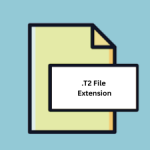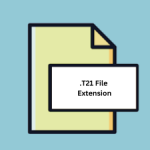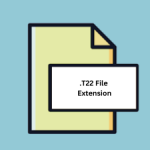.MMS File Extension

Transformation Extender Map Source File
| Developer | IBM |
| Popularity | |
| Category | Data Files |
| Format | .MMS |
| Cross Platform | Update Soon |
What is an MMS file?
The .MMS file extension is associated with Transformation Extender, formerly known as Mercator, which is a data transformation and integration tool used in enterprise environments. .MMS files are used to store map source files created within the Transformation Extender environment.
More Information.
Initially introduced as part of Mercator, which was later acquired by IBM and rebranded as Transformation Extender, .MMS files were designed to serve as the source files for data mapping operations. These files allow users to define transformations between different data formats, enabling seamless integration and exchange of data within an enterprise environment.
Origin Of This File.
The .MMS file extension originates from the Transformation Extender software suite, developed by IBM.
File Structure Technical Specification.
.MMS files typically contain metadata and instructions required by Transformation Extender to perform data mapping operations. They may include information about source and target data structures, transformation rules, field mappings, and other relevant configurations. The specific structure and technical specifications may vary depending on the version of Transformation Extender being used.
How to Convert the File?
Windows:
- Use Transformation Extender or any software compatible with .MMS files to open the file.
- Within the software, look for export options to save the file in a different format, such as XML or CSV.
- Choose the desired format and follow the prompts to complete the export process.
Linux:
- Use Wine or another compatibility layer to run Transformation Extender on Linux.
- Open the .MMS file within Transformation Extender.
- Export the file to a compatible format, such as XML or CSV, using the software’s export functionality.
macOS:
- Use virtualization software like Parallels Desktop or VMware Fusion to run Windows on your macOS system.
- Install Transformation Extender within the virtualized Windows environment.
- Open the .MMS file in Transformation Extender and export it to the desired format.
Android:
- Transfer the .MMS file to a computer running Windows, Linux, or macOS.
- Follow the respective steps mentioned above for converting on the corresponding operating system.
- Once converted to a compatible format, transfer the converted file back to your Android device for further use.
iOS:
- Transfer the .MMS file to a computer running Windows, Linux, or macOS.
- Follow the respective steps mentioned above for converting on the corresponding operating system.
- Once converted to a compatible format, transfer the converted file back to your iOS device for further use.
Convert using other methods or software:
- Explore third-party data transformation tools that support .MMS files or offer conversion capabilities.
- Look for online conversion services that may accept .MMS files and provide options to convert them to different formats.
- Consider custom scripting or programming solutions to parse and convert .MMS files to desired formats, depending on your technical expertise and requirements.
Advantages And Disadvantages.
Advantages:
- Facilitates efficient data integration and transformation within enterprise environments.
- Provides a standardized format for defining data mapping rules and configurations.
- Offers flexibility and scalability to accommodate diverse data formats and integration requirements.
Disadvantages:
- Requires specialized knowledge and training to effectively create and manipulate .MMS files.
- Limited interoperability with other data transformation tools and platforms.
- May pose challenges in managing complex data mapping scenarios and large-scale integration projects.
How to Open MMS?
Open In Windows
Transformation Extender, or any other software compatible with .MMS files, can be used to open .MMS files in Windows.
Open In Linux
Transformation Extender may not be natively available for Linux, but you can explore compatibility options using Wine or other compatibility layers. Alternatively, you may need to use virtualization solutions to run Windows applications on Linux.
Open In MAC
Similar to Linux, Transformation Extender may not have a native version for macOS. However, you can try running it using virtualization software like Parallels Desktop or using compatibility layers like Wine.
Open In Android
.MMS files are not typically designed to be opened on Android devices, as they are primarily used within enterprise environments for data integration and transformation tasks.
Open In IOS
Similar to Android, .MMS files are not intended for use on iOS devices due to their enterprise-focused nature.
Open in Others
part from Transformation Extender, there are few, if any, other software solutions specifically designed to open .MMS files. However, you may explore third-party data transformation tools that support importing .MMS files or converting them to other formats for further processing.













